We boarded the train, stowed our bags, and stretched out on the hard berths. When Dad said he’d booked a sleeping car, I’d imagined something like the Orient Express in the Agatha Christie movie, an elegant train car with beds, washbasins, and closets. What we got was a cramped compartment with four bunks in it. We took up three and a gangly Swedish girl, a college student traveling during the summer break, had the fourth bed. Her English was pretty good but her strongest language was snoring. She was so loud that her nasal whistles and rumbles almost cloaked the rhythm of the wheels clacking on the tracks.
I thought I hadn’t slept at all, but I must have since I woke up in the pale, thin light of dawn as the train chuffed into Termini, the main train station in Rome. Dad and Malcolm were already awake—or maybe they’d never slept. We all looked groggy and pouch-eyed. The Swedish student was still snoring, looking blissfully innocent while sounding like a tormenting demon. Even the noise we made gathering our stuff and stomping out of the compartment didn’t wake her.
We stepped out into a big building full of shops, restaurants, and streams of people towing luggage. The babble of Italian, French, German, English, Russian, and other languages I didn’t recognize rose over our heads. I could almost see the words floating to the ceiling like so many balloons. At the end of the train tracks, enormous boards showed all the places where passengers could be going—Paris, Geneva, Milan, Venice, Berlin, Madrid. Just reading the names, I imagined how easy it would be to get on any of those trains and find myself whisked away to someplace new and exciting.
Except we were in Rome, which was new and exciting in itself. Ever since I could hold a crayon, I’ve wanted to be an artist like my grandfather, and for centuries, Rome was the city where painters went to train their eye and their hand. I was here to help Mom, but I hoped I could improve my drawing while I was at it.
As soon as we walked out of the station, past the small cars and flocks of motorcycles, we saw our first ancient ruins. An enormous stone building with broad buttresses and high windows loomed across the street. It was a strange mix of styles. Later I realized they were layers, really—ancient Roman with Renaissance doorways and modern additions. Centuries folded into one structure. Most of the building was now a museum of ancient art. Somehow the sight of that woke us all up, especially Malcolm, who launched into his history teacher mode.
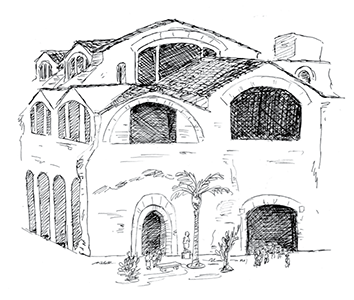
“This was originally the baths of Emperor Diocletian,” Malcolm explained. “Ancient Roman baths weren’t just bathtubs. They were enormous spa complexes with gyms, warm pools, cold pools, hot pools, dressing rooms, toilets. It’s so cool!” He was ready to go straight into the museum, to start exploring, but I dug in my heels.
“I’m not awake yet! I need to shower and brush my teeth.” Actually, I was itching to sketch, but I felt embarrassed by my lank, unwashed hair and my sour breath. If I was a real artist, I wouldn’t care. I’d just draw.
“Let’s at least get a cup of coffee,” Dad suggested. “Some breakfast will perk us up.”
“Okay,” Malcolm agreed reluctantly, even though I knew how much he depended on coffee, almost as much as Dad did, which was a lot. If my brother was an artist, he’d already be whipping out his sketchbook, caffeinated or not. Why couldn’t I be more like him?
But before we came to a café, we passed a set of Renaissance doors carved out of a wall of Roman rubble, also part of the ancient baths. The plain cross nailed high above the arched entrances and the words S. MARIA DEGLI ANGELI spelled out in black tiles on a severe white band were the only signs it was a church. Malcolm stopped at the central door, pleading with his big, brown puppy eyes.
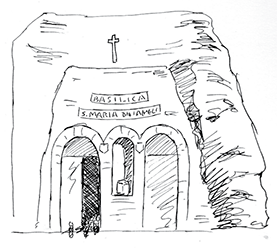
I had to smile. Only my brother would think a Roman ruin converted into a church was a special treat worth begging for.
“Just a quick look, all right?” Dad said. “We’ll have plenty of chances to see things later.”
“Promise—just in and out!” Malcolm pushed open the door, and the early morning sunshine disappeared into a vast, hushed space. For a church, it still felt classically ancient with colored marble panels, tall columns, and wide arches marking out the space in spare geometric symmetry. There were altarpieces and crosses in the chapels, but the big barrel vaults and the red, pink, and toffee-colored marble gave an impression of imperial grandeur, a seriousness of Roman law and order. The churchy bits seemed added on, not part of the building’s heart and soul, but scraps of decoration that could easily be removed.
In such an architectural marvel, Dad couldn’t help himself. Even without coffee to jump-start his brain, he pulled out his guidebook and explained that we were standing in what was once part of the baths of Emperor Diocletian and later turned into a church by Michelangelo—yes, that Michelangelo, the one who painted the Sistine Chapel. We’d been in Rome for maybe five minutes, and we were already seeing ancient and Renaissance Rome in the same building! That seemed like some amazing time travel right there.
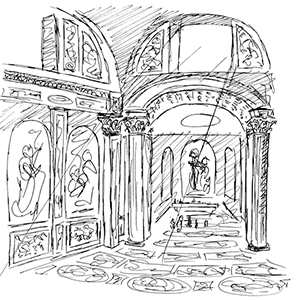
We’re in Rome! I thought, shivering with excitement. Somehow now it seemed real. The Sistine Chapel is here! Plus pizza and pasta and gelato. I wanted to go everywhere, eat everything at once. Suddenly I was starving, but something in the church kept me there. A deep crack split across the floor. As I came closer I saw it was a groove etched into the marble, zodiac symbols ranged on both sides of it.
It was some kind of calendar, and anything that measured time was magnetic for me now. I wondered if it could it be a touchstone. Could I have found one already, ready to hurl me back into time so soon? I could feel it pulsating with power, throbbing like a vein in the skin of the church. I hoped it was just the ragwort making me dizzy, or the lack of sleep, but just in case I stepped away from the bronze line.
“It’s a sundial and a meridian all at once,” I said, reading the explanation on the wall of the church while keeping a safe distance from the marker.
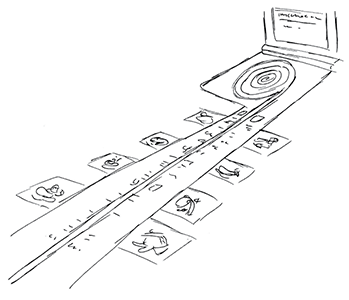
“How do you know that?” Malcolm was suspicious.
“Don’t act so shocked. Maybe I don’t know about science-y stuff, but I can read a label.” I can feel the time locked inside of it, I almost shouted, but I didn’t because that would make me sound as crazy as I felt.
“That label, there?” Malcolm pointed.
“Yeah?” I raised an eyebrow. Did he think I’d forgotten how to read now? Or could he somehow see the way the meridian was tugging at me, drawing me to it the way a river current carries along a leaf?
“Since when do you know Italian?” he asked.
“Since never. I don’t.” So he couldn’t feel the meridian’s pull. He just thought I was showing off.
“Then how come you’re reading an explanation written in Italian?”
I looked at the sign again. I’d just read it without thinking, but now that Malcolm mentioned it, I saw that, yes, it was in Italian, and yes, I could still understand it.
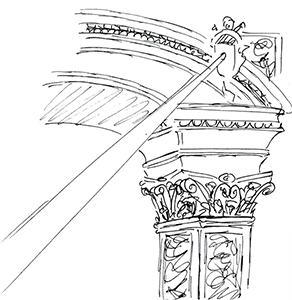
I gaped at Malcolm. “I can read Italian!” I hurried over to a cluster of tourists. Could I understand what they were saying? The pink-faced man and his equally pink wife and children sounded like they were eating meatballs, not speaking Italian. I listened for a while, until the father glared at me like I was an annoying beggar. Anyway, the guttural words were German or Swedish, and I didn’t understand anything. Maybe ragwort was specific in its language ability.
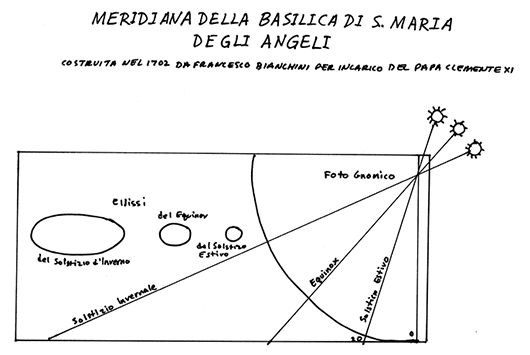
Next, I attached myself to a cluster of tourists listening to a tall, skinny man dressed like an undertaker and lecturing about the painting over the main altar. The elegantly dressed woman in front of me turned around and said something that didn’t sound friendly at all. She was speaking French far too rapidly for me to follow, but I gathered that she thought I was freeloading off their tour.
I scurried away, sitting in a pew next to two blond teenage girls who were laughing together as if they were in a park, not a church. I thought I’d hear some juicy gossip, but all I gleaned were some Russian-sounding words and a suspicious look from one of the girls. I got up, exasperated and embarrassed. Didn’t any Italians tour Italy? Didn’t Florentines visit Rome? Maybe someone from Venice or Milan?
Then I saw an old man hobbling next to his wife. They both looked far too old to travel much. I inched closer, trying to look nonchalant like just another tourist. Luckily, they didn’t notice me at all. They were speaking Italian, discussing what to eat for lunch and whether their daughter would drop by later. I could understand it all!
I rushed back to Malcolm and Dad.
“What was that about?” my brother asked. “You just ran away, all wild-eyed. Were you bugging that family? Spying on that tour group? Harassing that old couple?”
“I can understand Italian!” I said, excited. “Speaking, reading, everything! Isn’t that amazing!”
“That’s why Mom wanted you to eat the ragwort! It’s the only explanation! Here, let me try.” Malcolm held out his hand eagerly. That was a rare sight—my brother begging to eat something green.
I gave Malcolm a leaf and a petal since I wasn’t sure what part of the plant worked. He grimaced at the taste, swallowing quickly. But when he tried to read the sign, it was still indecipherable to him.
“Maybe it needs more time to work,” I suggested.
“Or maybe it only works if you have the time-travel gene, which obviously I don’t. It’s so unfair! Not only do you get to see all these cool historical things, but you get instant languages!”
I grinned. I hadn’t felt that lucky about time-traveling, but the language thing was definitely a plus.
“What time do you think I’ll travel to?” I asked, changing the subject to make Malcolm feel better. Which was clumsy of me since he was as jealous of time-traveling as he was of instant language skills.
Malcolm arched an eyebrow. He saw right through my lame attempt. “If you’re lucky, you’ll see Michelangelo paint the Sistine Chapel. Or better yet, you’ll watch gladiators fight it out in the Colosseum!”
“You’re not time-traveling yet,” Dad said. “Let’s enjoy the city. But first we should check into our hotel. I found us a place near the train station, so it can’t be far.”
I agreed. I wanted to explore Rome, the modern city, before I got hurled into the past. But the pull of the meridian was stronger now, like a mesmerizing magnet. I paced alongside it, measuring the seasons with my footsteps. I clenched my hands tightly to keep from touching anything, focusing on the floor with its etched designs for each sign of the zodiac. I looked up and Malcolm was right next to me, reassuring in his familiar lankiness and thick dark curls.
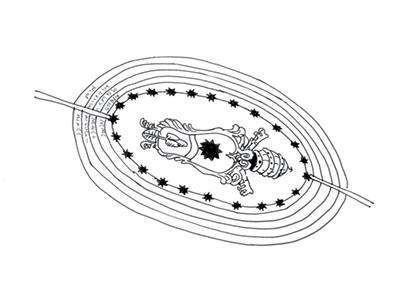
“Are you okay?” he asked. “You’re pale and sweaty.”
“I’m just tired, that’s all,” I said, relieved to be near him. I grabbed his arm, pushing him between myself and the meridian. I needed him to shield me from it or I wouldn’t be able to stop myself. I’d touch it.
“What’s wrong with you?” Malcolm shook himself free. “You look like you’re going to puke!”
I bent over, feeling sick. It was stronger than me. I couldn’t resist anymore. Something, some force, yanked my hand down, thrusting my fingers toward the archer, Sagittarius.
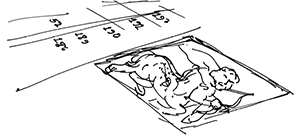
The marble floor melted under my hand, rippling like waves. The high arched walls fell away, the great dome spun off, and a black, starry sky swept around me, pulling me into a dizzying vortex. “No!” I screamed, but my words were caught in the ripples of time, cast out on the currents of centuries.
